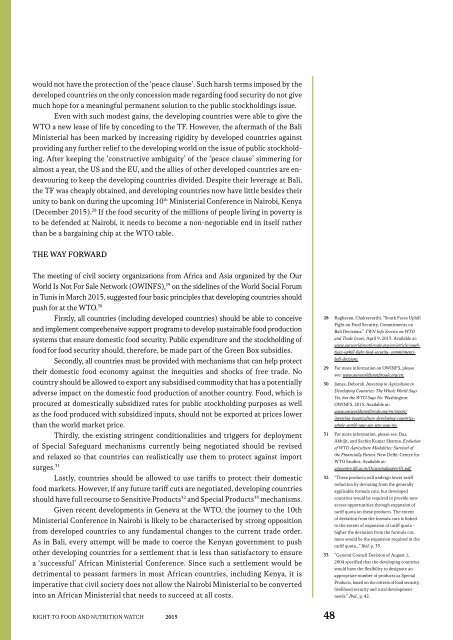RIGHT TO FOOD AND NUTRITION WATCH
1iNBHTY
1iNBHTY
Create successful ePaper yourself
Turn your PDF publications into a flip-book with our unique Google optimized e-Paper software.
would not have the protection of the ‘peace clause’. Such harsh terms imposed by the<br />
developed countries on the only concession made regarding food security do not give<br />
much hope for a meaningful permanent solution to the public stockholdings issue.<br />
Even with such modest gains, the developing countries were able to give the<br />
W<strong>TO</strong> a new lease of life by conceding to the TF. However, the aftermath of the Bali<br />
Ministerial has been marked by increasing rigidity by developed countries against<br />
providing any further relief to the developing world on the issue of public stockholding.<br />
After keeping the ‘constructive ambiguity’ of the ‘peace clause’ simmering for<br />
almost a year, the US and the EU, and the allies of other developed countries are endeavouring<br />
to keep the developing countries divided. Despite their leverage at Bali,<br />
the TF was cheaply obtained, and developing countries now have little besides their<br />
unity to bank on during the upcoming 10 th Ministerial Conference in Nairobi, Kenya<br />
(December 2015). 28 If the food security of the millions of people living in poverty is<br />
to be defended at Nairobi, it needs to become a non-negotiable end in itself rather<br />
than be a bargaining chip at the W<strong>TO</strong> table.<br />
THE WAY FORWARD<br />
The meeting of civil society organizations from Africa and Asia organized by the Our<br />
World Is Not For Sale Network (OWINFS), 29 on the sidelines of the World Social Forum<br />
in Tunis in March 2015, suggested four basic principles that developing countries should<br />
push for at the W<strong>TO</strong>. 30<br />
Firstly, all countries (including developed countries) should be able to conceive<br />
and implement comprehensive support programs to develop sustainable food production<br />
systems that ensure domestic food security. Public expenditure and the stockholding of<br />
food for food security should, therefore, be made part of the Green Box subsidies.<br />
Secondly, all countries must be provided with mechanisms that can help protect<br />
their domestic food economy against the inequities and shocks of free trade. No<br />
country should be allowed to export any subsidised commodity that has a potentially<br />
adverse impact on the domestic food production of another country. Food, which is<br />
procured at domestically subsidized rates for public stockholding purposes as well<br />
as the food produced with subsidized inputs, should not be exported at prices lower<br />
than the world market price.<br />
Thirdly, the existing stringent conditionalities and triggers for deployment<br />
of Special Safeguard mechanisms currently being negotiated should be revised<br />
and relaxed so that countries can realistically use them to protect against import<br />
surges. 31<br />
Lastly, countries should be allowed to use tariffs to protect their domestic<br />
food markets. However, if any future tariff cuts are negotiated, developing countries<br />
should have full recourse to Sensitive Products 32 and Special Products 33 mechanisms.<br />
Given recent developments in Geneva at the W<strong>TO</strong>, the journey to the 10th<br />
Ministerial Conference in Nairobi is likely to be characterised by strong opposition<br />
from developed countries to any fundamental changes to the current trade order.<br />
As in Bali, every attempt will be made to coerce the Kenyan government to push<br />
other developing countries for a settlement that is less than satisfactory to ensure<br />
a ‘successful’ African Ministerial Conference. Since such a settlement would be<br />
detrimental to peasant farmers in most African countries, including Kenya, it is<br />
imperative that civil society does not allow the Nairobi Ministerial to be converted<br />
into an African Ministerial that needs to succeed at all costs.<br />
28 Raghavan, Chakravarthi. “South Faces Uphill<br />
Fight on Food Security, Commitments on<br />
Bali Decisions.” TWN Info Service on W<strong>TO</strong><br />
and Trade Issues, April 9, 2015. Available at:<br />
www.ourworldisnotforsale.org/en/article/southfaces-uphill-fight-food-security-<br />
commitmentsbali-decisions.<br />
29 For more information on OWINFS, please<br />
see: www.ourworldisnotforsale.org/en.<br />
30 James, Deborah. Investing in Agriculture in<br />
Developing Countries: The Whole World Says<br />
Yes, but the W<strong>TO</strong> Says No. Washington:<br />
OWINFS, 2015. Available at:<br />
www.ourworldisnotforsale.org/en/report/<br />
investing-inagriculture-developing-countrieswhole-world-says-yes-wto-says-no.<br />
31 For more information, please see: Das,<br />
Abhijit, and Sachin Kumar Sharma. Evolution<br />
of W<strong>TO</strong> Agriculture Modalities: Survival of<br />
the Financially Fattest. New Delhi: Centre for<br />
W<strong>TO</strong> Studies. Available at:<br />
wtocentre.iift.ac.in/Occassinalpaper/01.pdf.<br />
32 “These products will undergo lower tariff<br />
reduction by deviating from the generally<br />
applicable formula cuts, but developed<br />
countries would be required to provide new<br />
access opportunities through expansion of<br />
tariff quota on these products. The extent<br />
of deviation from the formula cuts is linked<br />
to the extent of expansion of tariff quota -<br />
higher the deviation from the formula cut,<br />
more would be the expansion required in the<br />
tariff quota…” Ibid. p. 33.<br />
33 “General Council Decision of August 1,<br />
2004 specified that the developing countries<br />
would have the flexibility to designate an<br />
appropriate number of products as Special<br />
Products, based on the criteria of food security,<br />
livelihood security and rural development<br />
needs.” Ibid., p. 42.<br />
<strong>RIGHT</strong> <strong>TO</strong> <strong>FOOD</strong> <strong>AND</strong> <strong>NUTRITION</strong> <strong>WATCH</strong> 2015 48


